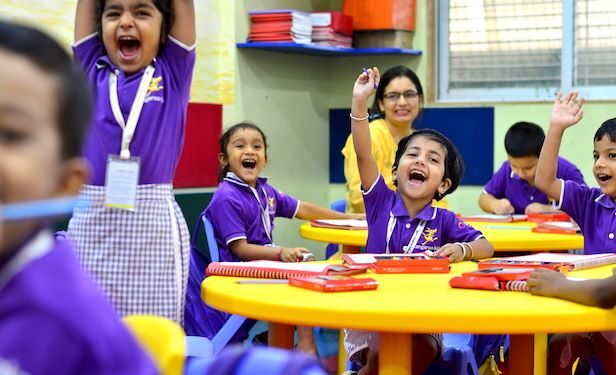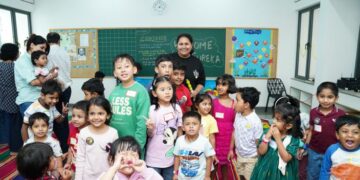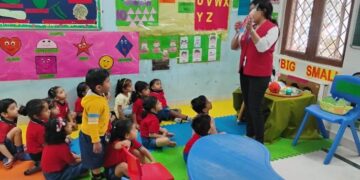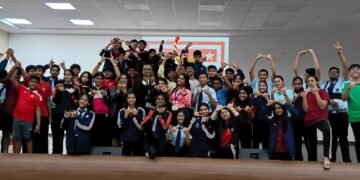The first five years of a child’s life are a period of unparalleled brain development, with 90% of brain growth occurring by the age of 5. This phase is crucial for cognitive, emotional, and social development. Research by the Centre for Early Childhood Studies and the Centre on the Developing Child at Harvard University emphasizes the importance of providing enriching experiences during this time to support long-term brain development and learning. The transition from home to preschool, particularly for toddlers aged 0-3 years, marks a critical stage in brain plasticity—where the brain is highly adaptable and receptive to new experiences.
Brain Development in the Early Years
The first three years of life are marked by rapid synapse formation, with over one million new neural connections forming every second. By age three, toddlers’ brains have approximately 15,000 synapses per neuron, more than double the synaptic density seen in adults (7,500 per neuron). This plasticity means the brain is highly responsive to environmental stimuli and early experiences, which lay the foundation for future cognitive and emotional abilities.
Research into molecular neuroscience has shown that the early brain’s plasticity allows it to be shaped by both positive and negative experiences. For instance, the expression of genes related to emotional regulation, resilience, and learning can be significantly influenced by the quality of early interactions. Positive early experiences can foster the development of critical brain architecture, while negative experiences (such as stress or neglect) can hinder this development, affecting long-term cognitive and emotional outcomes.
How Structured Toddler Programs Stimulate Brain Growth
Preschools and transition programs play a key role in harnessing the brain’s plasticity during these formative years. Play-based learning and structured activities are particularly effective at stimulating brain growth by engaging toddlers’ senses, language, and social skills. Examples include:
- Sensory Play: Activities like playing with water, sand, or clay engage the sensory pathways in the brain, stimulating the development of regions responsible for vision, touch, and motor coordination.
- Language-Rich Environments: Reading, storytelling, and conversational interactions with teachers and peers promote language acquisition and strengthen neural connections related to communication and cognitive processing.
- Interactive Games: Simple games like memory matching or shape sorting can activate cognitive areas responsible for problem-solving, pattern recognition, and spatial awareness.
- Social Play: Structured group activities foster social-emotional development by encouraging toddlers to engage in cooperative play, learn empathy, and manage emotions. These interactions help reinforce the prefrontal cortex, the area of the brain associated with decision-making, impulse control, and social behavior.
Research in molecular neuroscience also shows that dopamine levels rise when toddlers engage in curiosity-driven activities, such as exploring new objects or solving simple problems. These dopamine surges enhance motivation and memory, strengthening neural pathways essential for learning.
Critical Periods for Emotional and Social Learning
During the early years, toddlers go through “sensitive windows” for learning key emotional and social skills. These include:
- Empathy: The ability to understand and share the feelings of others.
- Self-control: Managing impulses and emotions.
- Problem-solving: Finding solutions to challenges through exploration and experimentation.
Preschools and toddler transition programs can create environments that support these developmental milestones by providing opportunities for cooperative play, conflict resolution, and emotional expression. For example, role-playing games and group activities help toddlers navigate social norms, understand emotions, and build a foundation for empathy and emotional intelligence.
Myelination and Cognitive Speed
Myelination, the process through which nerve fibers are insulated with myelin, is critical for the development of cognitive and motor skills. This process enhances the speed and efficiency of neural communication. As toddlers engage in activities such as puzzle-solving, block building, and creative play, they stimulate the myelination of neurons, leading to faster cognitive processing and improved problem-solving skills.
Preschools that incorporate collaborative play and structured creative activities encourage fine motor skills and cognitive development. For instance, block-building games not only improve hand-eye coordination but also stimulate spatial reasoning and problem-solving abilities. Similarly, activities like puzzle-solving enhance pattern recognition and logical thinking, reinforcing myelination processes in the brain.
The Long-Term Impact of Quality Early Education
The early experiences children have can influence not just their immediate brain development, but their long-term outcomes as well. Positive early experiences, including nurturing relationships and stimulating educational environments, can lead to beneficial epigenetic changes that foster resilience, emotional stability, and cognitive flexibility. These experiences are foundational to building a growth mindset, which in turn affects academic and social success throughout life.
On the other hand, negative early experiences, such as exposure to stress or neglect, can lead to adverse epigenetic modifications, which may predispose children to difficulties with emotional regulation, learning, and behavior. Early childhood education programs that focus on emotional security and cognitive stimulation can help mitigate these risks, offering a buffer against the effects of stress and adversity.
The Role of Parent and Teacher Support in Toddler Transitions
Smooth transitions from home to preschool are critical for toddler development. Research shows that transition programs that offer structured support during this stage can significantly improve a child’s emotional and academic outcomes in the long run. These programs focus on creating a safe, predictable environment where children can build trust, explore their new surroundings, and develop the confidence to engage with peers and teachers.
Key components of effective toddler transition programs include:
- Routine Establishment: Predictable routines provide a sense of security, helping children feel more comfortable in new environments.
- Social-Emotional Learning: Activities that teach children how to manage emotions, resolve conflicts, and work cooperatively with others.
- Parent Involvement: Ensuring that parents are engaged in the transition process, through regular communication and involvement in learning activities, can strengthen the child’s sense of security and continuity.
The early years of a child’s life are a critical period for brain development, and the experiences children have during this time lay the foundation for their future cognitive, emotional, and social well-being. By providing structured, nurturing environments through toddler transition programs and early childhood education, we can stimulate brain growth, foster emotional resilience, and promote a love of learning. This is crucial not just for the individual child, but for the broader social and educational progress of society.
Investing in high-quality early childhood education is an investment in the future, one that can have profound and lasting effects on the child’s overall development and success in life.














